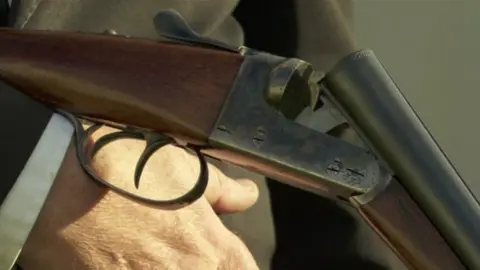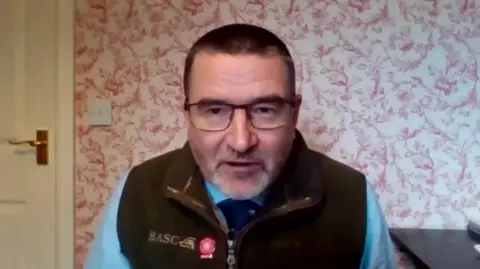Will new gun licence fees make Britain safer?
 BBC
BBCOn 12 August 2021, a man from Plymouth shot and killed five people before turning the gun on himself.
His victims were Maxine Davison, Sophie Martyn, Lee Martyn, Stephen Washington and Kate Shepherd.
Two years ago, the families of those who died listened to five weeks of evidence at the inquest that followed.
I was part of a small group of journalists who saw the pain on their faces as they heard of the "catastrophic failures" which led to a 22-year-old man with a history of violence being given a gun licence.
When the process concluded, the families told the BBC about the urgent change they wanted to ensure "no other family" had to endure their torment.
'Under-resourced' licensing process
The cost of a gun licence has now increased to just under £200, more than double what it was at the time of the killings.
When I have talked to friends and colleagues about the increase, their first thought is that this is a deterrent - a measure intended to reduce the number of people who can afford one.
Actually, this is about trying to make sure the police who carry out the checks on people applying for a licence have enough money and time to do the job as thoroughly as possible.
In one of his prevention of future deaths reports after the shootings, Plymouth Coroner Ian Arrow said that "until the firearms licensing process becomes self-funding… there will be an unacceptable risk that licensing units will be under-resourced, with insufficient staff who are inadequately trained making rushed and ill-informed decisions".
An inquest heard how, at the time of the Plymouth incident, the price of a shotgun certificate was £79.50 - less than the cost of a passport - for a document that required a home visit.
The inquest jury was told gun licensing was being subsided by taxpayers, with the true cost varying greatly between police forces, and estimated for one force to be in excess of £500 per application.
One measure of the under-resourcing of the Devon and Cornwall Police gun licensing department was the huge rise in the number of its staff following the Plymouth incident: it more than doubled from 45 in 2021, to 99 in 2023.
The government said the price increase would fully cover the cost to police forces of carrying out the checks on people applying to hold a shotgun.
However, the largest group representing UK gun owners, the British Association for Shooting and Conservation (BASC), said that, unless the money was ring-fenced, chief constables might spend it on something else.
Martin Parker, head of firearms at the BASC, said there was "no guarantee" that the extra money would go into firearms licensing.
He said: "The way police budgets run, it is very much up to the chief constable how any monies… are spent.
"The safety aspect is absolutely fundamental. It's not in anyone's interest for the wrong people to get firearms. Resources are definitely one part of the equation."

In Devon and Cornwall, there are also concerns about whether the extra money will amount to full-cost recovery.
This in part because of the need for home visits across a large geographical area.
The force has said it was "too early to understand" whether the increase would fully cover its costs.
Devon and Cornwall Police Commissioner Alison Hernandez said that "it is clear that the fees remain significantly short of covering the actual costs to Devon and Cornwall Police".
The Home Office has been asked if it had considered ring-fencing the money, and if ministers accepted the increase might not amount to full-cost recovery for all forces.
A Home Office spokesperson said: "Public safety is paramount and we are delivering on the government's manifesto commitment to increase firearms licensing fees.
"The additional revenue raised will give the police the funding they need to improve services and keep the public safe."
Mr Parker said he found it hard to believe that the increased amount would not cover costs.
Pointing to possible inefficiencies, he said any force which found itself in that position needed to "take a long hard look at its processes".
'Maintaining robust procedures'
Devon and Cornwall Police Assistant Chief Constable Matt Longman said: "We welcome the changes to the fee structure as it may be additional funding that can be utilised to support sustainable and efficient firearms licensing.
"However, we are yet to understand the full impact an increase in fees will have and we will continue to work with the Home Office while their proposal progresses.
"Our focus remains on maintaining the robust procedures we have in place for the granting of licences to ensure the communities of Devon and Cornwall remain safe."
The BBC understands the government is still planning to publish a formal response to a consultation on further changes conducted by the previous government, but the timescale is yet to be confirmed.
Follow BBC Cornwall on X, Facebook and Instagram. Follow BBC Devon on X, Facebook and Instagram. Send your story ideas to [email protected].
